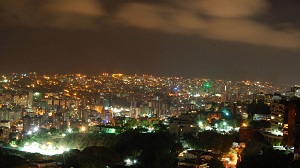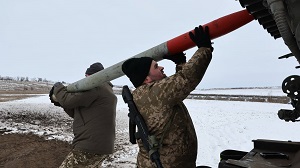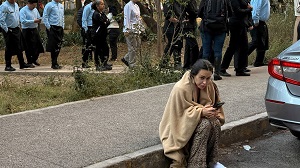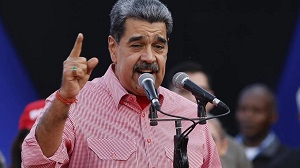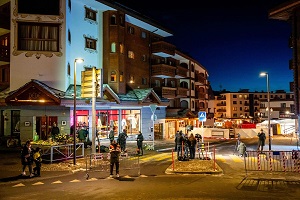Identities that Kill Lebanon’s Neutrality - By Elias Harfoush, Asharq Al-Awsat
Recent talks about Lebanon’s neutrality are not new, nor are they alien to the calls that many politicians have made since Lebanon’s independence from French mandate in 1943.
The struggle over Lebanon’s identity and belonging has always accompanied all critical political turning points in Lebanese history, between those vaunt western culture and those who demand that Lebanon exclusively belongs to Arab identity; even this issue remained suspended until the Taif Agreement resolved it.
In the context of this open debate, Maronite Patriarch Beshara al-Rai’s call came to revive the idea that the Lebanese entity was built on, i.e. the National Pact that Beshara el-Khoury, the first Lebanese post-independence President, and first Premier Riad al-Solh agreed on.
In one of its articles, the Pact stipulated that “Our brethren in the Arab world do not wish for Lebanon anything but what the patriotic Lebanese wish for. We do not wish for it to be a colonial establishment and they do not wish for it to be a pathway for colonialism to reach them. We both wish it to be a dear nation that is independent, sovereign and free.”
Since then, attempts have been made to reconcile Lebanese rivals on a common ground that would satisfy the majority in Lebanon and would not pose a threat to neighboring countries. A large segment of Christians in Lebanon at the time, led by former President Emile Edde, known as the Kotlawiyyeen, longed for the French mandate, while a segment of Muslims preferred to maintain close ties with Syria that had not yet achieved its independence.
Consequently, the formulation that el-Khoury built the project of independence on was an attempt to constitute a shared national identity on a pile of internal disputes and struggles. That bloc called itself The Constitutional Bloc to affirm its allegiance to the new constitution.
The attempt to reconcile opposing sides and stand neutral in conflict remained the main concern whenever Lebanon suffered a national shock or difficult crisis such as the one it is going through today; the country was born of contradictions and has always remained in need of internal reconstruction.
What Patriarch al-Rai is calling for today is following the footsteps of those attempts. If we retrieve his words we would find him nearly repeating the text of the Pact verbatim: A call to commit to shared Arab causes without entering political or military struggles or joining alliances. A call for the UN to implement international resolutions and restore Lebanon’s independence and neutrality. In other words, the Patriarch is calling for the Lebanese to return to running their own internal affairs without any of their parties taking part in alliances and plans that pose a danger or threat to the interest of their country or neighboring Arab states.
Since its independence and through later eras, the Lebanese have remained confused and divided around the issue of belonging and identity.
In the era of Camille Chamoun, which followed the era of Beshara el-Khoury, the government was open to the Baghdad Pact against the Arabist movement led by Gamal Abdel Nasser who was supported by a large segment of Muslims. During that period, the first visit the Iranian Shah made to Lebanon took place in 1957, after which it was announced that there will be diplomatic relations between Iran and Lebanon.
Chamoun’s era ended with a bloody internal conglict in 1958 which was known as the Civil War, a miniature version of what Lebanon witnessed 17 years later. This ushered a change of political currents in Lebanon and the rise of Fouad Shehab to the presidency under a US-Egyptian agreement after the Eisenhower administration’s position against the British-French-Israeli trio in the Suez war.
The Eisenhower administration pressured Camille Chamoun not to renew his term, paving the way for Shehab to reach power and to rule under a regional and international umbrella that secured six years of internal stability for Lebanon and during which most of its administrative institutions were built.
This struggle over identity remained raging by those [among Christians particularly] who considered Shehab’s rule Nasserist. This ended with the Shehabi rule, of which Charles Helou’s presidency was an extension, being defeated, and the triumph of what was known as the Allegiance of Triple Alliance that included leaders of the main Christian parties at the time (Camille Shamoun, Pierre Gemayel and Raymond Edde) and in 1970 secured the rise of Suleiman Frangieh to the presidency.
Frangieh reaching presidency was accompanied by an important event in South Lebanon, the Cairo Agreement that was signed in the Egyptian capital under the sponsorship of President Abdel Nasser between the Palestine Liberation Organization (PLO) led by Yasser Arafat and the Commander of the Lebanese Army back then, Emile Bostany.
The agreement provided the Palestinian resistance with the freedom to move along the southern border with Israel, and this hurled Lebanon into the heart of that conflict and was the spark that paved the way for the Civil War in 1975 that raged for 15 years, and the Lebanese were divided by, once again, between those who support the Palestinian resistance and those who oppose its operations on the border and its interference in Lebanese affairs.
The implosion of crises across the region that followed the Lebanese war due to the increasing influence of Iran, pushed many politicians to uphold the slogan of “being neutral” in an attempt to divert the implications of those crises from Lebanon. The most dangerous of these was Hezbollah’s intervention in the Syrian war and its support of the Houthi coup in Yemen, in addition to continued media campaigns against Arab countries, following the path of Iranian policies.
However, Hezbollah’s influence renders achieving Lebanese neutrality more difficult than ever. Throughout all of the different divisions among the Lebanese around foreign allegiances, never have they had such an impact on Lebanese relations as they are today. That is because never has a Lebanese party had so much power over the Lebanese state like Hezbollah does today. Hezbollah’s military force equals if not exceeds that of the legitimate army, and the influence it has been able to impose on institutions under Michel Aoun makes it difficult for any Arab country outside the so-called “Resistance Axis” to deal with the Lebanese authorities as independent from Hezbollah.
From this we understand that Patriarch al-Rai’s call for Lebanon to be neutral towards regional conflicts is a call for the state to restore its authority and decision-making and a call for Hezbollah and its supporters to be considerate towards Lebanese interest that has been damaged by its [Hezbollah] allegiance to Iran and its interests while it wages war in four different Arab countries and against the people of those states, doing whatever it takes to secure its own national interests.
